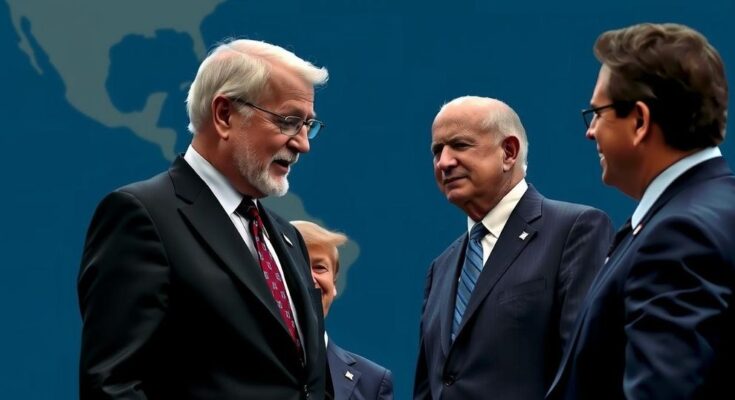President Biden is set to embark on a significant trip to South America, attending the APEC summit in Peru and the G20 summit in Brazil. Amid concerns about future U.S. foreign policy under Donald Trump, Biden’s meetings will focus on reinforcing alliances, addressing trade, and highlighting climate change commitments during historic visits to the Amazon. The engagement with world leaders aims to ensure a smooth transition ahead of the new administration’s potential policy changes.
President Joe Biden is undertaking a significant diplomatic journey to South America, likely marking his final international engagements before the transition to President-elect Donald Trump. This trip includes attending the Asia-Pacific Economic Cooperation (APEC) summit in Lima, Peru, where he will meet with various world leaders, including Peru’s President Dina Boluarte. The backdrop of this summit is heightened scrutiny due to proposed tariff policies from Trump’s administration, which may disrupt global trade. National Security Adviser Jake Sullivan emphasized that Biden’s discussions aim to “reinforce America’s leading role in the Indo-Pacific” and highlighted the positive trajectory of U.S. relationships within the region. A pivotal moment during this trip is Biden’s anticipated meeting with China’s President Xi Jinping, their first since November, which aims to facilitate a seamless transition and maintain crucial military communication channels. Following the meeting with President Xi, Biden will travel to Manaus, Brazil, marking a historic moment as the first sitting U.S. president to visit the Amazon rainforest. This visit underscores his commitment to combatting climate change, especially as the incoming administration may pursue a significantly different approach toward environmental issues, including a potential withdrawal from the Paris Agreement. Biden’s tour concludes in Rio de Janeiro, where he will participate in the G20 summit. Here, he seeks to reassure allies of America’s continuing commitment to global partnerships, particularly as it relates to pressing issues such as the Ukraine conflict and economic support for lower-income nations. Sullivan reiterated Biden’s consistent message of valuing allies as vital to U.S. national security, a sentiment likely to resonate amid changing foreign policy dynamics under a new administration.
The article discusses President Biden’s diplomatic visit to South America, which is framed within the context of a major transition in U.S. foreign policy as Donald Trump prepares to assume the presidency. Biden’s engagements at the APEC summit and G20 summit are pivotal as they coincide with uncertainties regarding the United States’ role globally. Additionally, Biden’s focus on climate change during his visit to the Amazon reflects an ongoing commitment to environmental issues that may face significant shifts under the new administration.
In summary, President Biden’s upcoming trip to South America is poised to serve as a crucial diplomatic engagement, addressing both immediate foreign policy concerns and broader climate issues. By reinforcing alliances and engaging with critical leaders, such as President Xi Jinping, Biden aims to preserve American influence on the global stage. This visit not only highlights pressing global challenges but also sets the stage for the foreign policy landscape that the new administration will inherit.
Original Source: abcnews.go.com




